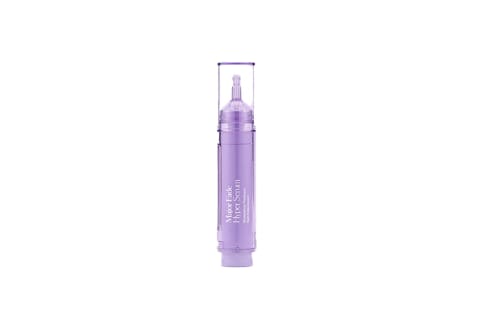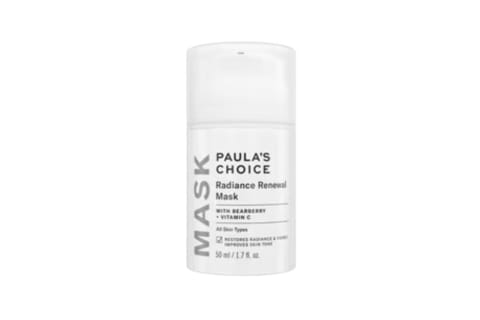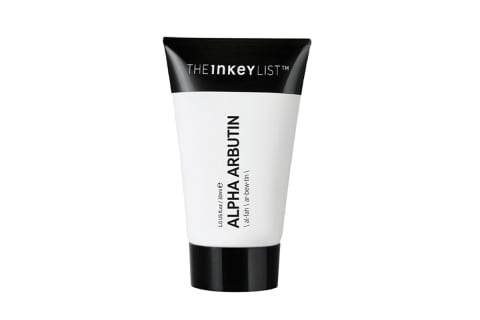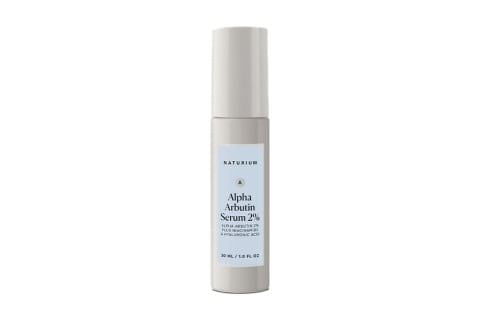Advertisement
What Is Alpha Arbutin & How Does It Affect Your Skin? Experts Explain


Let's be honest, the skin care industry is all about buzzy ingredients. (For better or for worse.) Well, this new-to-me ingredient had me at hello because banishing dark spots and hyperpigmentation is No. 1 on my priority list.
So, once I got wind of the super lightener alpha arbutin, I knew I had to add this to my beauty arsenal.
We tapped two experts, a cosmetic chemist and a dermatologist, to get the scoop on alpha arbutin, including what it is and how to find it. Because it's the answer to the brighter, more even skin tone you've been dreaming of for years.
What is alpha arbutin?
According to cosmetic chemist Kelly Dobos, arbutin is a naturally occurring chemical found in some botanical extracts like bearberry, cranberry, and Japanese pear. Arbutin is, essentially, a natural variant of the controversial hydroquinone. The latter is controversial for several reasons, like severe sensitivity, photosensitivity, irritation, and contamination issues.
However, with alpha arbutin hydroquinone is slowly released into the skin, making the side effects far less severe (if present at all).
Arbutin works by stopping dark spots from forming—unlike exfoliators, which slough off surface-level pigment, or other antioxidants, which fight free radical damage resulting in a brighter appearance overall.
"Arbutin works to inhibit tyrosinase, an enzyme present in melanocytes, the pigment-producing cells in the skin," says board-certified dermatologist Tiffany Jow Libby, M.D. "This results in less pigment, dark spots and skin lightening."
Not to mention, it has antioxidant and anti-inflammatory properties, too and there is some laboratory evidence that it may even help fight off melanoma1.
Arbutin isn't the only other additive to do this, however; similar ingredients include licorice root and kojic acid.
Summary
What are the benefits of using alpha arbutin?
When it comes to the skin, alpha arbutin is best known (and loved) for its complexion-brightening properties. Here, what you can expect from using alpha arbutin.
- Fades and prevents dark spots & melasma. As we've noted alpha arbutin blocks production of tyrosinase, an enzyme responsible for the over production of pigment in the skin. So it will help reverse and prevent future dark spots from forming.
- Has antioxidant & anti-inflammatory properties, which help fight free radicals. Antioxidants neutralize free radicals, thereby stopping the havoc they wreak on the skin.
- Helps reduce acne & post-inflammatory hyperpigmentation. Arbutin2 has antimicrobial, anti-inflammatory, and antioxidant properties, making it an asset for acne-fighting, as it soothes skin while also targeting any potential bad bacteria.
- Less irritation than straight hydroquinone. Because the hydroquinone is released slowly into the skin, it's much more gentle. There's far less occurrence of photo sensitivity and irritation.
How to use alpha arbutin in your routine
How you’ll use this in your routine is entirely up to what product you pick. Alpha arbutin tends to be formulated into serums, dark spot correctors, brightening moisturizers, and treatments (like masks). Here, an overview—but then check out our favorite products just after.
- Serum: Serums with alpha arbutin should be applied onto freshly cleaned, dry skin.
- Dark spot correctors: Dark spot correctors are applied on clean skin, focusing just on the area of pigmentation such as melasma patches.
- Moisturizers: Face lotions and creams go on after your serums, but before oils and sunscreens.
- Treatments: Some masks and treatments have alpha arbutin in them. Follow the product’s instructed use.
Best alpha arbutin products
The good news is you can find alpha arbutin products just about anywhere you find quality skin care products. Below are some of mbg's favorites. But before you buy, it's always best to consult with your local dermatologist to make sure this ingredient is right for you and your skin concerns.
Alpha arbutin vs arbutin
In case you're wondering, many use the terms alpha arbutin and arbutin interchangeably, and that's because alpha arbutin is simply a variant of the original chemical.
"There are two isomers of arbutin, the alpha and beta forms," Dobos says. "They differ in structure and properties."
She also states that alpha arbutin is about 10 times more effective than beta arbutin when it comes to skin-brightening effects, which is why so many are reaching for this powerhouse ingredient when it comes to bettering the skin.
Cautions
Even though alpha arbutin is the beloved skin brightener, it can be a bit questionable since it is a form of hydroquinone. In fact, Libby says alpha arbutin actually works by slowly releasing hydroquinone to lighten the skin.
But that is, in fact, one of the reasons experts are reaching for this ingredient for reducing hyperpigmentation. Since the hydroquinone is slowly released, the pesky side effects and questionable toxicity of hydroquinone aren't really a big deal.
Libby says the short answer is if you're looking to minimize, fade, and treat dark spots on the skin, alpha arbutin is worth a try.
But since it is a form of hydroquinone, it's best to steer clear of this ingredient while pregnant and/or breastfeeding.
Dobos also adds that even though alpha arbutin is suitable for most skin types, those with sensitive skin may want to avoid using high levels or combining with products containing other potentially irritating ingredients, like retinol.
What other ingredients work well with alpha arbutin?
Since your goal is to reduce dark spots and hyperpigmentation, Dobos recommends pairing alpha arbutin with other ingredients that also improve the tone of the skin for best results.
- Alpha & beta hydroxy acids: "Combining with gentle AHAs and BHAs can further help reduce the appearance of pigmentation in surface layers of the skin," Dobos says.
- Kojic acid: "Enhanced efficacy has also been reported when combined with other skin-brightening actives like kojic acid." Kojic acid is another pigment inhibitor that works by blocking tyrosinase. Research, too, confirms its ability to to brighten skin and fade dark spots3.
- Niacinamide: The B vitamin, niacinamide, is another ingredient Dobos name checks for its brightening properties. It has the added benefit of boosting the skin barrier. Research shows that niacinamide increases the production of ceramides and fatty acids in the skin.
- Sunscreen: And as always and to no surprise, you'll want to pair this ingredient (and all other skin care products) with the daily application of a broad-spectrum sunscreen. Not only can sun exposure worsen dark spots and cause new spots to form, but it will help to safeguard the results you may see when using alpha arbutin.
The takeaway
Alpha arbutin is an answer to reducing the appearance of hyperpigmentation and dark spots. It's generally great for all skin types but should be avoided if you're a soon-to-be or nursing mama. Let's just say, we wouldn't be surprised if alpha arbutin starts popping up all over beauty shelves in the near future. Yes, it's that good.
Want more tips on treating dark spots? Check out mbg's full guide to fading and preventing age spots.















